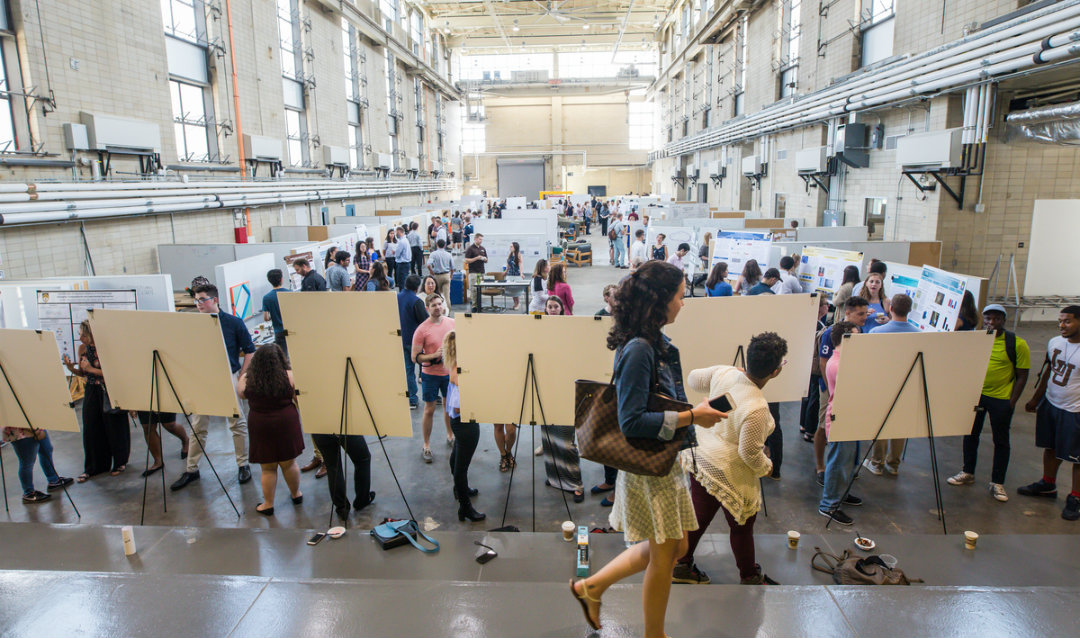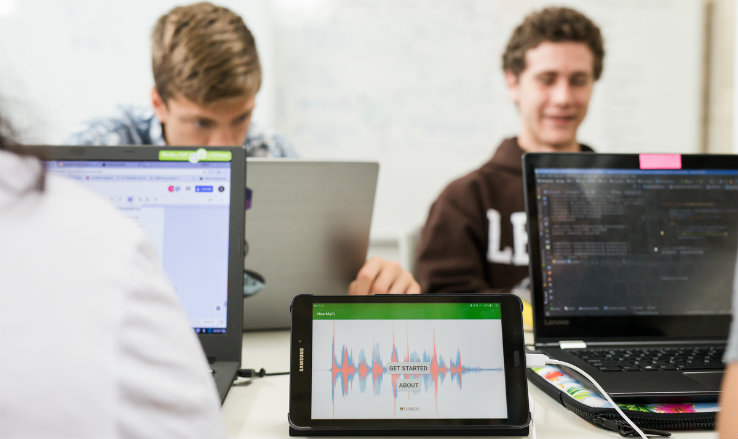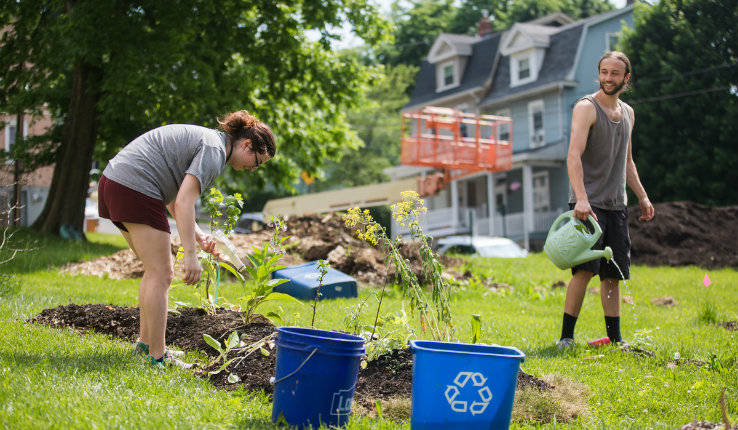“Mountaintop gives students the space and support to really dive into a project they're passionate about. And it's been incredible to see so many of these projects extend far beyond the summer months, engaging even more students during the academic year. Personally, I'm very much looking forward to more ‘Beyond Bars’ and ‘Parklets,’” said Karen Beck Pooley, professor of practice in political science and mentor for the “Beyond Bars” and “Pop-Up Parklets” projects (see list below for project details).
Says Al Bodzin, professor of instructional technology and teacher education and mentor for the “Immersive Virtual Reality (VR) Development of the Lehigh River Watershed” project: “The Mountaintop project provides students with an in-depth authentic experiential project that provides them with unique skills that are very different than what is possible in a typical university setting.”
This summer’s Mountaintop projects focus on a wide range of issues.
“Every single one of these projects is an excellent investment because if the teams were to accomplish what they are setting out to do, the world would be a better place and a lot of people would see that difference,” says Mehta. “Mountaintop teams do things that really matter, that really move the needle, that can really contribute to improving the human condition.”
2019 Mountaintop Projects
A Digital Imagining of Outsider Creativity: This project will conduct background research on outsider art, creativity, and Mr. Imagination; compilation, digitalization, and review of available film/video and images. This cinematic case study project will explore the key existential question of how dreams are a motor of creativity affecting all forms of human endeavor.
Beyond Bars: This project will continue the work started in 2018 where students examined the issue of mass incarceration and the role of art and culture. Beyond Bars will continue to experiment with using art and culture to convey different types of social justice, as well as create new theatre and art pieces to bring attention to these critical issues.
Collaborative Localization and Mapping with a Team of Robots: The focus of this project will be on Visual Localization and Mapping of autonomous robots (quadcopter drones). This project will develop basic algorithms and software packages using a Robot Operating System to collect visual samples and perform object classification. Senior team members will develop more advanced machine learning algorithms.
Entrepreneurship, Identity, and Social Justice: Charting a Path Toward More Inclusive Economies: This project seeks to interrogate the challenges and opportunities of entrepreneurship through the prism of gender, race, and LGBTQ identities, with particular attention to the business community in Bethlehem. What challenges are faced by businesses owned by women, people of color, LGBTQ people and their allies in the Lehigh Valley and what solutions might be implemented to help work through those challenges?
Forging Ahead through Engineering Leadership: This project will build upon the work begun last summer when students successfully developed a VR model of the Loewy heavy press, Major. This summer, the students will determine if the primary development will be a compelling immersive experience or an educational experience to teach how metal properties are changed through forging.
HearMyCl: A Patient-Customized Cochlear Implant Simulation App: This project will focus on continuing the work this past summer, when a beta version of an app was developed for “translating” cochlear implants from young children to their caregivers. The goal for summer 2019 is to complete product development and develop an applied research plan for HearMyCl. Students will gain stakeholder input into how HearMyCl can best be implemented with caregivers of children.
High Value Solar Fuels from Carbon Dioxide and Water: The overall goal of this Mountaintop project is for students to develop new ideas starting with a black box model to conceptualize high value products utilizing solar energy, and then to prototype and make them. Students will be encouraged to creatively develop these products with the guidance of an interdisciplinary faculty team, in order to identify high-yield solutions to high CO2 levels.
Immersive Virtual Reality (VR) Development of the Lehigh River Watershed: This project will continue the work developed last year, when the team developed a highly immersive VR space for educational settings that investigates the history, ecology, and environmental issues of the Lehigh River watershed. This summer, students will complete the development of four VR modules: Transportation Corridor of the Lehigh Gap; Superfund Site and Recovery; Industrial History; and Environmental Science of the Lehigh Gap. We will also develop content-based measures to test the efficacy of learning in the VR environment with Building 21 high school students and Lehigh undergraduate students.
Making LGBT Archives Accessible Online and in Exhibition Spaces: This project team will work with the Bradbury-Sullivan LGBT Community Center which, since its opening in 2016, has collected materials from community members, LGBT owned businesses, and regional media to start an archive dedicated to the Lehigh Valley LGBT community. This archive is becoming more accessible to LGBT people and allies in the Lehigh Valley, and the team will imagine and design accessible digital platforms for archival material and effective public exhibitions of archival material.
Mushroom Production Houses: This project will refine and proliferate mushroom production houses for Sierra Leonean farmers, to be utilized as a source of income and a cash crop when others are not accessible. Following successful field work in this area in Cambodia during the summer of 2017 and Sierra Leone in the summer of 2018, members of the team will again travel to Sierra Leone this summer to conduct further tests and build networks.
Neurogenetics of Creativity: This project will continue work done over the past few years attempting to uncover the genetic link between forms of anxiety and creativity. In recent semesters, students have conducted mouse behavioral experiments and identified a genetic mutation which may provide the link. This summer, students will test the effect of the mutation identified, using a manipulatable system, as well as speaking to artists in the community to create a broader pool of creative subjects for study.
New Virtual Reality Teaching Tool for Chemistry Lab: This project will utilize emerging virtual reality (VR) technology for chemical education. The VR technology can connect many students in the classroom with expensive equipment in the laboratory. Students will research, discover, and create new modes of VR-assisted teaching and learning to provide a virtual advanced research lab within the lecture classroom.
Novel Approaches to Addressing Malnutrition in Children in Sierra Leone: Malnutrition and micronutrient deficiencies are common in Sierra Leone, especially among children under five years of age. The focus of this project is for students to develop nutritious, ready-to-eat or easy to prepare foods that are inexpensive and compatible with current dietary habits in Sierra Leone. The project consists of two separate teams: one focusing on products for infants and toddlers, the other focusing on children aged 2-5 years.
Paper-based Tests for Sickle Cell Diseases and Anemia in Sierra Leone: This project will develop point-of-care diagnostics for sickle cell disease and anemia for specific use in Sierra Leone. The product created will be simple and easy to use, minimizing the need for training by medical professionals. This team will travel to Sierra Leone in August 2019 to build networks, research healthcare systems, and begin marketing successfully-tested lab discoveries.
Pop-Up Parklets: Parklets are an urban design movement begun in cities like San Francisco, Philadelphia, and New York, where small community spaces are constructed to improve neighborhood walkability and accessibility. This project continues the work begun summer 2017. Students will construct, install, collect data and do some preliminary reporting on their findings with this summer’s parklet which will be installed in South Bethlehem in front of a local business.
Project Plastikan: This project aims to provide income opportunities for women in a partnering local community outside of Manila, Philippines, by building a plastics recycling facility and researching the design and manufacture of products from disposed plastics. Through this project, women in the community will be manufacturing up-cycled products themselves as a source of income. The team will also design and build test products using replicatible equipment.
River Meandering: This project will continue the work from last summer’s Mountaintop program in answering the perplexing question of the cause of river meandering. Students will focus on answering lab experimentation questions as well as Google Earth analysis of natural systems.
Safe Motherhood in Sierra Leone: Although Sierra Leone has the highest maternal mortality rate in the world, the nation has also built a resilient health care system in an attempt to address this crisis. This team will be researching how Sierra Leone has worked to confront this issue and establish a functional health care system. Our goal is to produce a festival-ready documentary film. All majors are welcome and you need not have filmmaking experience to participate.
Sands Casino Documentary: This project will continue the work begun during the 2017-2018 academic year, where a team of students began development of a documentary film about the effects of the Sands Casino on south Bethlehem. Students will market the film, creating a website and developing a soundtrack and music for the film. Students will compile an oral history and digital map using the research and interviews completed for the film.
Socioeconomics of Ebola: Sierra Leone was one of the countries more affected by the 2014 Ebola virus epidemic in West Africa, and only in 2016 did the WHO declare the country Ebola-free. Still, the problem is latent in a region that is under the risk of a new outbreak due to the lack of advanced health infrastructures and different social and cultural factors (e.g. burial rituals, bushmeat markets...). In this project, the final goal is to develop and implement a cellphone app that doctors can use to register socioeconomic factors and habits of Ebola patients.
Southside Permaculture Park: This project will continue the work started in the 2017-2018 academic year where students began designing and building a park based on principles of permaculture as an educational, agricultural, and community gathering space. The major project for this summer will be that the students will build a Calitheater (an original design that attempts to integrate various lifestyles and activities into one structure). The students will also develop a business plan and implement a plan for evaluating social integration, psychological well being and school learning outcomes.
Southsider: Redesigning a Hyperlocal News Source to Inspire Civic Engagement: The project team will pursue building a solid university community website that fosters a better informed citizenry and increased civic engagement. This site will focus on Bethlehem with an emphasis on local history, arts and politics.
Squeezing Every Last Drop: Recovering and Valorizing Waste for Sustainability at the Energy-Water Nexus: This project will design and develop a sustainable, “silver bullet” solution to the burgeoning global demand for fresh water despite worsening pollution and growing energy restrictions. The energy potential currently locked in the organic pollutants comprising wastewater exceeds by 10x the energy consumed in conventional microbial-based wastewater treatment processes. Current technologies recover just 20-50 percent of the organics, while more efficient emerging technologies are molecule-specific and are, thus, unable to handle wastewater diversity. Appropriately designed porous adsorbents offer a versatile alternative and game-changing platform that may enable near 100 percent recovery and processing of organic matter from wastewater, with a cost structure that could enable net-positive energy production.
Ukweli Test Strips: Members of this team will travel to Sierra Leone during the summer to conduct field work and expand on-the-ground operations and distribution/education aspects of extremely inexpensive (2-cent) test strips to screen people for urinary tract infections and diabetes in Sierra Leone and other developing countries.
Understanding Color-Blind v. Color-Conscious Socialization of Racial Attitudes in Families: This project will uncover how and why some families take a more proactive “color conscious” approach to racial socialization and others take a color blind approach. Students participating in this project will survey white parents about their approach to socializing compassion, humanitarian values and racial attitudes. The students will explore the literature to discover the characteristics of parents that lead to color-conscious white parents.
Re-Writing the Script: Virtual Reality Transforming Race Relations: This project will examine how people engage in interracial interractions—what makes them go well and the factors that make them fall apart. Students will create various stressful interracial encounters in VR that can be rescripted by participants to improve their interaction outcomes. VR provides a unique opportunity to safely test how repeated exposure to stressful interracial encounters can provide people with numerous opportunities to “practice” interracial interaction anxiety-reduction techniques.







